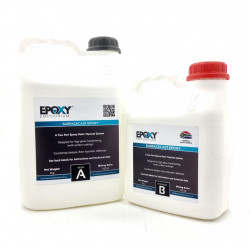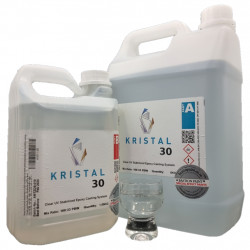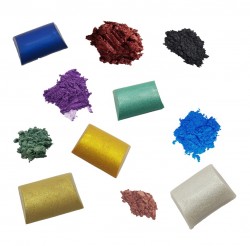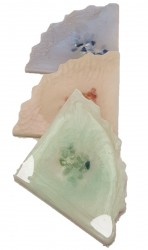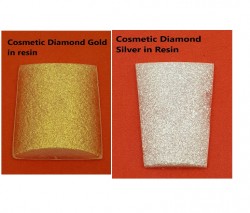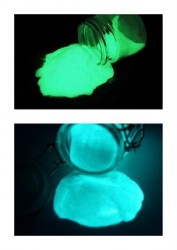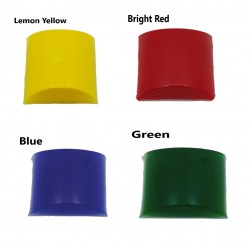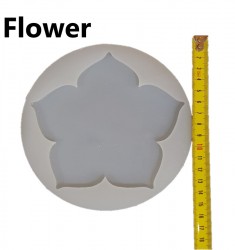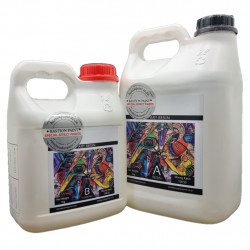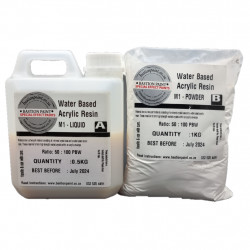Countertop & Shallow Casting Epoxy Resin
Availability:
- Manufacturer's Brand Name: Kristal Diamond 6®
- Clear, UV Stabilised, Approved for Food Contact.
- The cured resin is glossy, ultra-hard (scratch resistant) and suitable for temperatures up to 80degC.
- A high flow resin for thin layers of 1mm to 5mm.
- Typical Applications: Bar counters and table tops, jewellery, shallow moulds, clear coating over art, coating over other resins to increase hardness and give food contact properties and thin layer resin art (e.g. art on glass, wood, tiles etc). Due to the high flow nature of the resin, sides are required to get minimum 1mm thickness (the resin may not spread properly in layers less than 1mm thick).
Countertop & Shallow Casting Epoxy Resin
Overview
- Used in layers of 1mm to 5mm thick.
- Clear, UV Stabilised (slow to yellow compared to non-stabilised resin but clear resin will eventually start to discolour outdoors).
- FDA approved for food contact up to 50oC. (Test method: FDA 21 CFR 177.2600 report number GZ190826027FR)
- Low viscosity (high flow resin) so air entrainment is less of a problem than with higher viscosity systems.
- The cured resin is suitable for temperatures up to 80oC.
- The cured resins is glossy, strong and ultra-hard (Shore D Hardness: 90). It is very scratch resistant but not scratch proof.
Most of our silicone moulds are about 5mm deep so this resin can be used is almost all the moulds that we sell. At 5mm thickness the resin has the advantage of curing quickly. As it is an extremely hard resin it does place more wear and tear on the moulds than a slightly softer resin does. As our Medium Casting Resin can be used in layers of 5-20mm thickness it is also suitable for many of our silicone moulds. Our Medium Casting Resin will cure significantly slower in a 5mm layer but it will cause less wear and tear to the moulds than this resin will.
Typical applications of this epoxy resin
- Bar Countertops and Tabletops. This is a low viscosity (high flow) resin so the surface must have sides to retain the resin. Sides can be made with tape.
- Kitchen Countertops. Restrictions are that despite being ultra-hard and scratch resistant the resin will be damaged by hard knife cuts and by hot items over 80oC.
- Thin layer resin art (e.g. art on glass, wood, tiles etc) where a thin (high flow) resin is required.*.
- Jewellery, Coasters and other shallow mould castings up to 5mm deep.
- Clear, glossy layer over art where a thin (high flow) resin is required.* Do not use over oil based paints or art with oily substances.
- Cast as a thin layer over other resins to increase the surface hardness and/or to create a surface suitable for food contact.
* Do not go below 1mm thickness as surface tension issues may be encountered. Surface tension defects can look like small craters or like the resin is 'pulling apart'. This can happen on un-sealed wood even if you start with a resin layer greater than 1mm because resin will be absorbed into the wood resulting in a thinner layer on the surface. As this resin has a high flow it will flow off the edges of a surface before it gets to 1mm thickness. Some retaining boarder is required to get a layer of at least 1mm (tape can be used to create a side). Always gain experience with each resin type before you use it on a critical application e.g. over an important painting.
You can download a PDF document with detailed specifications and instructions from this website page and if you purchase we will send a hard copy with your order.
General points for all resin work
Pack Size |
|
| Unit Size |
1.33kg (1.21 Litres)
6.65kg (6.05 Litres)
0.33kg
|
Size |
|
| Size | |
Starter Pack |
|
| Starter Pack | |
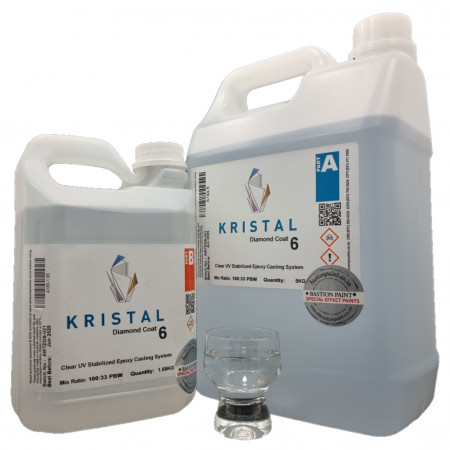


 Countertop & Shallow and Medium Casting Epoxy Resins
Countertop & Shallow and Medium Casting Epoxy Resins




